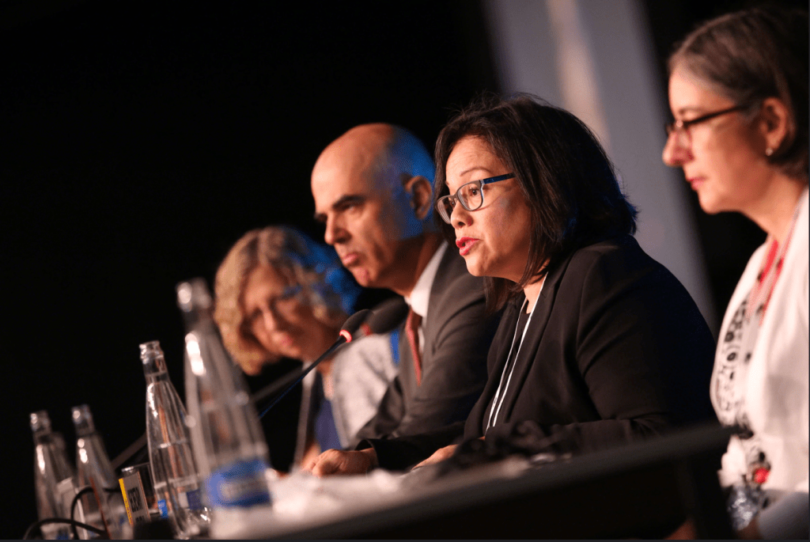Sea Shepherd’s Recommendations Taken Seriously at CITES CoP 18
Published by Sea Shepherd Conservation Society
Sea Shepherd’s legal team took part in the world’s most important conference on endangered wildlife trade to make recommendations to protect the vaquita porpoise from extinction, based on the NGO’s extensive experience in the field.

The triennial global wildlife conference, known formally as CoP18 of the Convention on International Trade in Endangered Species of Wild Fauna and Flora (CITES), was held in Geneva, Switzerland from the 17th to the 28th of August, 2019. The illegal trade of totoaba fish (Totoaba macdonaldi) was one of the pressing topics to be addressed, as it is the driving force behind the extinction of the most endangered marine mammal in the world, Mexico’s vaquita porpoise.
The vaquita porpoise faces imminent extinction due to illegal gillnets set to ensnare the totoaba fish, which is also critically endangered. The totoaba is targeted for its valuable swim bladder to be sold in Asian black markets with alleged medicinal properties that have never been proven. Both species are endemic to Mexico’s Gulf of California.
During the discussion on how to address the international illegal trade of totoaba parts, Sea Shepherd Legal presented an intervention on the floor delivering Sea Shepherd’s recommendations to save the last remaining vaquita. “Our intervention at CITES CoP 18 was critical to ensuring that the Parties to CITES understand the significant threats facing the vaquita and the associated on-the-ground complexities, so that assistance to Mexico can be effective and immediately undertaken. We work extensively on international treaty implementation for the long-term health of the oceans.” Stated Catherine Pruett, Executive Director Sea Shepherd Legal.

Mexico has come under intense pressure at CITES and has been urged by Parties and NGO’s such as Sea Shepherd Legal to intensify protections in the vaquita reserve (including increasing net removal efforts and protecting net removal teams), to break up totoaba crime gangs, enforce UNESCO recommendations, and operationalize the trilateral enforcement group (Mexico, USA and China). If progress is unsatisfactory, the next Standing Committee meeting (tentatively scheduled April 2020) may consider compliance measures including trade sanctions against Mexico.
Sea Shepherd has been present in the Vaquita Refuge for the last five years under an agreement of cooperation with the government of Mexico and remains committed to providing its full assistance. Sea Shepherd has deployed multiple vessels from its patrol fleet, monitoring poaching and retrieving 990 pieces of illegal fishing gear, including approximately 141 kilometers of gillnet – all from vaquita habitat. Sea Shepherd’s vessel, the M/V Sharpie is currently inside the vaquita habitat performing an important visual spotting expedition in collaboration with CONANP (Mexico’s National Commission on Protected Areas) as well as leading Mexican and US scientists to gather data and visual identification of the last vaquita porpoises.
Sea Shepherd Science been contributing to vaquita research, aiding the Mexican Commission for the Knowledge and Development of Biodiversity (CONABIO)’s acoustic monitoring program and providing gillnet and fauna engagement data to the International Committee for the Recovery of the Vaquita (CIRVA).
“Sea Shepherd’s determination in our fight to protect the vaquita porpoise is clear, we take a holistic approach to a very complex situation,” said Captain Locky MacLean, Sea Shepherd’s Director of Marine Operations. Adding, “we work in the field by removing the immediate danger to the vaquitas presented by gillnets, we provide intelligence and policy recommendations to government and enforcement authorities, and we gather and analyze scientific data to support research efforts. We are also working with legal fishermen to understand their concerns and support them on ridding the area of illegality, and finally we work with our legal team to influence international conservation actions.”
Sea Shepherd’s illegal gillnet removal program, Operation Milagro, will resume in early October, working with Mexican authorities as shrimp season begins in the Upper Gulf of California.
Read Sea Shepherd Legals Intervention Document Here.
Read the full article at: https://seashepherd.org/2019/08/29/sea-shepherds-recommendations-taken-seriously-at-cites-cop-18/?utm_source=rss&utm_medium=rss&utm_campaign=sea-shepherds-recommendations-taken-seriously-at-cites-cop-18





